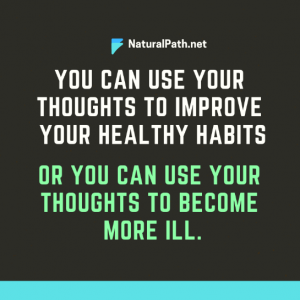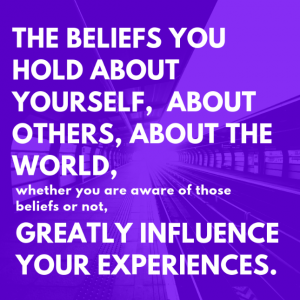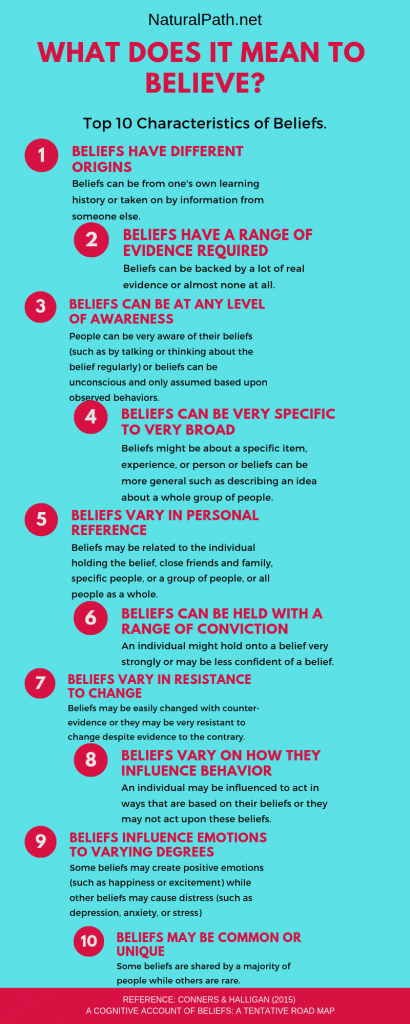Your little child stumbles and scrapes her knee. She looks up at you expectantly, and because you see blood, the look on your face is one of alarm. Seeing your expression startles her and then she starts to cry. You move toward her and kiss her on the wound. The crying stops. This is an example of our first experience with nocebo and placebo.
Thoughts can change your life for better or worse
 Your thoughts have the power to change your life. Science shows that your personal thoughts and beliefs, or suggestions from others, can have a tremendous impact on how you experience life, view yourself and others, as well as what physical and emotional experiences occur in your everyday life.
Your thoughts have the power to change your life. Science shows that your personal thoughts and beliefs, or suggestions from others, can have a tremendous impact on how you experience life, view yourself and others, as well as what physical and emotional experiences occur in your everyday life.
Your thoughts and personal beliefs can heal you. Your thoughts and personal beliefs can make you sick.
Science has demonstrated the impact of how our thoughts can improve our health, specifically by analyzing the placebo and nocebo effects as well as looking at the impact of internal language on our well-being. Thoughts can help you by leading to an increase in desired symptoms (think: mood regulation, improved sleep, etc.) or hinder you by leading to an increase in undesired symptoms (think: pain or anxiety).
What is the placebo effect?
Placebo is derived from Latin to mean “I shall please” and was used to inspire hope and healing in patients. The term “the placebo effect” was coined by a Harvard trained anesthesiologist who witnessed the effect during World War II. When morphine supplies were exhausted, injured soldiers were given saline injections instead of the painkiller and still experienced pain relief. The placebo effect is an outcome that occurs when a person experiences a positive outcome as a result of personal beliefs or information gathered from another source (such as a doctor), even if the actual activity or intervention is considered to lack therapeutic value.
The expectation of symptom improvement can be all that is needed to improve someone’s physical or emotional symptoms. Past experiences, context, and biological traits are all factors that influence the degree to which someone may be impacted by the placebo effect.
Studies show that anxiety and depression can be positively influenced by the placebo effect. The placebo effect and psychotropic medications have a similar impact on individuals with anxiety or depression. In both cases, similar neural pathways in the brain are being activated suggesting that one’s personal expectations or verbal suggestion from others (leading to the placebo effect) can be as effective as medication.1
What is the nocebo effect?
Similar to the placebo effect, the nocebo effect is an outcome that an individual may experience based upon personal beliefs or information they take in from another source. However, the nocebo effect is a negative outcome (something a person wouldn’t want to experience) while the placebo effect is a positive outcome (something a person does want to experience).
A study was published by Häuser, Hansen, and Enck in 2012 titled, “Nocebo phenomena in medicine: Their relevance in everyday clinical practice.” They analyzed research on the nocebo effect. The nocebo effect is when a symptom (generally thought of as a negative experience) is displayed after a negative outcome has been suggested.2
A nocebo effect can occur as a result of an individual’s own thoughts or beliefs or as a result of suggestions from others, such as doctors or professionals. Sometimes the nocebo effect may occur even unintentionally…that is, the person triggering the effect may not realize the negative message they are sending about the specific intervention or treatment provided.
For example, when a doctor lists the possible side effects of a treatment, a nocebo effect could occur in the patient. The patient may experience related negative side effects or undesired outcomes as a result of the doctor’s statements.
Additionally, the patient’s own negative expectations or beliefs about the treatment could result in an undesired outcome (a nocebo effect).
A nocebo effect (negative or undesired outcome) can occur from an individual’s own beliefs including the beliefs that person has about others. For instance, a patient may trust a doctor’s advice and information, and when a doctor lists the possible side effects of an intervention, the individual may experience a nocebo effect.
This result may also come about simply by experiencing a thought that was created by information given by another person (in this case, the doctor).
Change your thoughts, change your life
 Our thoughts and beliefs are powerful. Our internal language (thoughts and beliefs) have a very complex network of associations and learning history as well as room for continued influence. This means that you can use your thoughts to improve healthy habits or you can use your thoughts to become more ill.
Our thoughts and beliefs are powerful. Our internal language (thoughts and beliefs) have a very complex network of associations and learning history as well as room for continued influence. This means that you can use your thoughts to improve healthy habits or you can use your thoughts to become more ill.
Think about these 2 scenarios….
- You wake up in the morning and think to yourself, “I am exhausted! I want to stay in bed. I am always so tired. I don’t have the energy to get through today.”
- You wake up in the morning and think to yourself, “This is going to be a great day! I am going to take a walk, drink some water, and get ready for this day. I am grateful for this day!”
In those 2 scenarios, which thought process would be more beneficial to your general health and well-being? If you practice scenario #2 more often, you are likely to experience greater energy, improved mood, and possibly even help with chronic fatigue, depression, stress, or other ailments.
How do your thoughts have the power to heal or harm you?
The placebo and nocebo effects are related to outcomes that are desired or undesired by the individual as a result of personal beliefs or communication from others rather than as a result of the impact of the actual treatment itself.
Your thoughts can impact your health positively or negatively in medical treatment as well as everyday life.
The placebo effect is believed to exist as a result of the psychological concept of Pavlovian conditioning, reactions to expectations, and social learning through observation of others.
According to a scientific study, you can help yourself to physically or mentally feel better by having positive thoughts. Focusing on positive thoughts and thinking in an optimistic way can help you to heal.
Here are a few examples:
- When building a healthy habit such as exercise, think positively by telling yourself that exercise is good for your health and that it can boost energy, mood, and help with depression, heart health, and more.3
- When trying to recover from the common cold, use positive thoughts to improve your chances of recovering more quickly.
- When working on overcoming depression, practice positive thinking to increase your feelings of peace and joy and decrease the symptoms of depression.
Neural pathways of the placebo and nocebo effects
The neural pathways that play a role in the experience of a placebo or nocebo effect include the body’s dopamine and endogenous opioids. Interestingly, the brain releases more dopamine and endogenous opioids during the placebo effect while the opposite happens (less of these chemicals are released) during the nocebo effect.
During the nocebo effect, other neural pathways are used, as well. This is because the experience of undesired symptoms (like pain) is often related to the experience of anxiety, resulting in other processes in the brain being triggered.
Believing — what does it mean?
 “Belief can be defined as the mental acceptance or conviction in the truth or actuality of some idea.”3
“Belief can be defined as the mental acceptance or conviction in the truth or actuality of some idea.”3
Beliefs are defined in psychology to allow for a clearer picture of human mental processes. Basically, beliefs are viewed as thoughts or ideas that a person has while holding onto that thought or idea strongly with the opinion that it is true or accurate.
Sometimes there are beliefs that you may be conscious of and identify with in conversation, or when thinking about things you believe. However, most of the time people are not aware of their beliefs.4
Beliefs can impact your experience in everyday life. The beliefs you hold about yourself, about others, or about the world, whether you are aware of those beliefs or not, greatly influence your experiences.
Consider these beliefs:
- If you believe people are generally good, you are more likely to see the good in people as compared to believing people are inherently bad.
- If you believe that you are a fairly healthy person, you are more likely to feel healthy than if you consider yourself to be in chronic pain and sickness.
- If you have frequent negative thoughts about yourself (like feelings of failure or that you can’t get things right), you may experience depression and therapy and other interventions may be helpful in teaching you to change your thought process to develop healthier beliefs.
- If you think you can accomplish your goals, you are more likely to succeed than if you don’t believe in yourself.
The mind is everything. What you think, you become. ~ Buddha
The internal process of believing
There are 5 stages of belief formation.4 These stages are typically unconscious. A person doesn’t realize that they are going through these steps in the process of forming their personal beliefs.
The 5 Stages of belief formation include:
- Precursor – The initial stage of belief formation involves the trigger that may eventually develop into a belief.
- Search for Meaning – At this stage, the person is looking for a way to fit the precursor into their already existing set of beliefs.
- Candidate Belief Evaluation – At this stage, the person is assessing the possible belief in comparison to pre-existing beliefs.
- Belief Acceptance – A proto-belief (possible belief) that survives the evaluation phase is accepted as a true belief.
- Effects of Belief – Once a belief has been accepted, the belief is now able to influence the person’s thoughts, actions, and worldview.
Can someone speak healing into your life?
As mentioned, your thoughts can impact your well-being, but, as seen with the placebo and nocebo effects, another person can give you information that could potentially make you feel better or reduce your negative symptoms (such as pain or anxiety).
Researchers have found that positive verbal suggestion and mental imagery can induce positive expectations. However, when given general information, verbal suggestion may not be as strong of an influence on experience of pain, itch, and fatigue symptoms. Therefore, another person can be more influential over your experience of health or sickness when they provide you with specific information about the experience and outcomes.5
Think your way to health
Your thoughts can make you sick. Your thoughts can heal you.
You can have a meaningful impact on others through the use of your words and how you speak to them.
If you use the power of your thoughts intentionally, you can experience greater health and well-being in your everyday life.
References:
- Holmes, R.D., Kiwari, A.K., & Kennedy, J. L. (2016). Mechanisms of the placebo effect in pain and psychiatric disorders. The Pharmacogenomics Journal, 16,491-500.
- Häuser, W., Hansen, E., & Enck, P. (2012). Nocebo phenomena in medicine: their relevance in everyday clinical practice. Deutsches Arzteblatt international, 109(26), 459-65.
- Warburton, D. E., Nicol, C. W., & Bredin, S. S. (2006). Health benefits of physical activity: the evidence. CMAJ : Canadian Medical Association journal = journal de l’Association medicale canadienne, 174(6), 801-9.
- Connors, M. H., & Halligan, P. W. (2015). A cognitive account of belief: a tentative road map. Frontiers in psychology, 5, 1588. doi:10.3389/fpsyg.2014.01588.
- Peerdeman, K. J., van Laarhoven, A. I., Donders, A. R., Hopman, M. T., Peters, M. L., & Evers, A. W. (2015). Inducing Expectations for Health: Effects of Verbal Suggestion and Imagery on Pain, Itch, and Fatigue as Indicators of Physical Sensitivity. PloS one, 10(10), e0139563. doi:10.1371/journal.pone.0139563.
 Razi Berry is the founder and publisher of the journal Naturopathic Doctor News & Review, which has been in print since 2005, and the premier consumer-faced website of naturopathic medicine, NaturalPath. She is the host of The Natural Cancer Prevention Summit and The Heart Revolution-Heal, Empower and Follow Your Heart, and the popular 10 week Sugar Free Summer program. From a near death experience as a young girl that healed her failing heart, to later overcoming infertility and Chronic Fatigue Syndrome and Fibromyalgia through naturopathic medicine, Razi has lived the mind/body healing paradigm. Her projects uniquely capture the tradition and philosophy of naturopathy: The healing power of nature, the vital life force in every living thing and the undeniable role that science and mind/body medicine have in creating health and overcoming dis-ease. Follow Razi on Facebook at Razi Berry , join her Love is Medicine group to explore the convergence of love and health, and find more Love is Medicine podcast episodes here.
Razi Berry is the founder and publisher of the journal Naturopathic Doctor News & Review, which has been in print since 2005, and the premier consumer-faced website of naturopathic medicine, NaturalPath. She is the host of The Natural Cancer Prevention Summit and The Heart Revolution-Heal, Empower and Follow Your Heart, and the popular 10 week Sugar Free Summer program. From a near death experience as a young girl that healed her failing heart, to later overcoming infertility and Chronic Fatigue Syndrome and Fibromyalgia through naturopathic medicine, Razi has lived the mind/body healing paradigm. Her projects uniquely capture the tradition and philosophy of naturopathy: The healing power of nature, the vital life force in every living thing and the undeniable role that science and mind/body medicine have in creating health and overcoming dis-ease. Follow Razi on Facebook at Razi Berry , join her Love is Medicine group to explore the convergence of love and health, and find more Love is Medicine podcast episodes here.


















